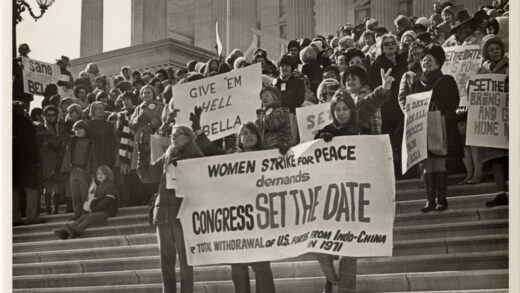by Jennifer Tapia

In this episode, I’ll explore the connection between Chicana women and their belief in the catholic church. We’ll explore early reproductive justice activism in the Chicano community with the workshops and conferences held in the 1970s and how activism is still happening today with organizations like the National Latina Institute for Reproductive Justice.
Transcript
Note: I’ll be using Chicano and Latino interchangeably because a lot of the data I cite uses the term “Latino” when talking about the Chicano community, but please keep in mind that both identities are different.
It’s not a secret that abortion rights were one of the top issues for voters in the 2024 election.
In fact, my home state, Arizona, was one of the states that had a proposition on the ballot that would amend the state constitution to expand abortion access. It would allow abortion until fetal viability, or about 24 weeks, compared to the 15 weeks currently allowed.
According to Associated Press, the proposition passed with just about over 60% of voters voting yes.
I’ll admit, I was honestly a bit shocked when I heard it passed. According to the National Association of Latino Elected and Appointed Officials, one fourth of eligible voters in Arizona are Latino, so I’m aware that the Latino population had a big part in getting this proposition passed.
Yet, as a Latina myself, I know abortion is a touchy subject among us in the community. In fact, reproductive health in general isn’t really talked about with each other. However, the subject at hand isn’t so black and white as one might think.
During the 1970s, Chicana Feminism rose because the current Chicano Movement had left no space for Chicana women’s voices to be heard. In fact, the Chicano philosophy was that men were expected to be the leaders of the movement and women were to fill their role in the home as a mother. Any action that would go against this belief, such as discussions of contraceptives and abortion, was thought as a betrayal to our culture. However to quote Chicana Activist Francisca Flores, “OUR CULTURE HELL!”
Fransica Flores was one of the early Chicana feminists. During the early 1970s, she helped organize one the first Chicana workshops where Chicana women can voice their thoughts and opinions which would lead to the formation of Chicana organization, Comisión Femenil Mexicana Nacional.
Other Chicana workshops were happening across the country, and in 1971, Houston, Texas would hold the first national Chicana Conference. According to Flores, this conference had 600 participants. The most controversial workshops were Sex and the Chicana-Noun and Verb; Marriage: Chicana Style, and the Feminist Movement: Do We Have a Place In It? In fact, a group of Chicana walked out because they felt the feminist movement was a white women issue and Chicana women’s roles were to be at home and be mothers.
So, how is being a mother and anti-sex part of the culture? Well, this goes back to Chicano’s close ties to the church. Specifically, the religious figure La Virgen de Guadalupe, which translates to the Virgin of Guadalupe. La Virgin de Guadalupe is the representation of the perfect woman. She is a mother, but also a virgin. Graciela Olivarez talks about this in her speech at the conference. She states, “The young men look up to their mothers as saints, as virgins (all women worthy of marriage must be virgins). The mother is placed on a pedestal. The young man cannot face the fact that his mother had to have intercourse with his father in order to give birth to him.”
If we are to talk about a child who was naturally conceived, it is physically impossible that the birth mother is a virgin. Although impossible, it is what is expected of Chicana women. To be the perfect mother and wife, she must be pure herself. If a woman’s worth is based on her virginity, how could a woman talk about reproductive health without feeling she’s betraying her culture? When lust is demonized, women are less inclined to talk about it.
Flores acknowledges in an article regarding the conference that young Latina women have high rates of abortions. She mentioned that some of these girls refuse contraceptives for a variety of reasons and would rather risk an abortion instead. Some of these girls are at risk of a third abortion before they are 20.
So why would Chicanas risk an unwanted pregnancy than taking the pill? Abortion and pregnancy is framed as a punishment a woman must accept for committing her sin. As Flores explains, an abortion can spin the narrative that the act of sex was a mistake of the moment. By being on the pill, you are acknowledging you are sexually active and are actively committing a sin.
Despite the walkout of some the participants, the first national Chicana conference agreed on a few resolutions, but here are a few that stood out to me:
One: “We recognize that we have been oppressed by religion and that the religious writing was done by men and interpreted by men. Therefore, for those who desire religion, they should interpret their Bible, or Catholic rulings according to their own feelings, what they think is right, without any guilt complexes. ”
Chicanas encourage each other to question their faith and reinterpret the Bible and its teachings. Afterwards, some may find a new sense of comfort and freedom, while others may decide it’s best to leave their faith altogether. In the end, it’s not about keeping or losing the faith, but recognizing that faith shouldn’t make you feel ashamed or less worthy or isolated.
Two: “Women should go back to the communities and form discussion and action groups concerning sex education.”
Three: “Free, legal abortions and birth control for the Chicano community, controlled by Chicanas. As Chicanas we have the right to control our own bodies.”
And four: Chicanas support “free family planning and free and legal abortions for all women who want or need them.”
While Flores acknowledged the dangers of young women using abortion as contraceptives, it should also be recognized that she isn’t opposed to abortions. The idea is that women shouldn’t be shamed for their decision in regards to their bodies. Many of these young women getting abortions instead of using birth control is rooted in the shame of having had sex and these abortions are still seen as a punishment. Again, this decision goes both ways, if a Chicana chooses to have a child, she should have that right and have the resources to do so.
In order to move past the guilt and shame associated with sexual desires, sexual education is a must. Education and having open discussions of reproductive health erases the negative connotation. Not only does it normalize it, it teaches young women safe practice of sex.
The wake of Chicana feminism movement would be the stepping stones for organizations that continue to educate Latinas and Chicanas on reproductive health like the National Latina Institute for Reproductive Health or NLIRH.
NLIRH was the first independent national organization for Latinas on reproductive rights issues. It was established in 1994 and was part of a project from the organization Catholics for a Free Choice as a way to expand information about reproductive health and promote pro-choice efforts.
For those who may not be familiar, the term reproductive justice was coined by the Black Women’s Caucus at a national pro-choice conference in 1994. Essentially it’s a movement that fights for women to have the right to have children, the right not to have children, and the right to be able to raise a family. These could be seen in the form of not only access to abortion and contraceptives, but also access to healthcare such as cervical exams and access to resources to raise a family such as childcare.
It’s crazy to think that the first national Chicana Conference in the 1970s had resolutions in regards to this wider issue that Chicanas and other women of color face, yet there wasn’t a term for it until 1994.
Today, the organization has state offices in Virginia, New York, Texas, and Florida. On their website, they have links to resources that explain reproductive justice and fact sheets in regards to health care coverage.
Chicanos and Latinos have been fighting for reproductive justice for so many years and we see it have an impact today!



Bibliography
AP NEWS. “2024 Arizona Election Results | AP News.” AP News, November 25, 2024. https://apnews.com/projects/election-results-2024/arizona/?r=83101.
Chicanas, undated, Third World Women’s Alliance, Bay Area chapter records, Sophia Smith Collection of Women’s History, SSC MS 00697, Smith College Special Collections, Northampton, Massachusetts.
Espinoza, Dionne, Cotera, María Eugenia, and Blackwell, Maylei, eds. Chicana Movidas : New Narratives of Activism and Feminism in the Movement Era. Austin: University of Texas Press, 2018. ProQuest Ebook Central.
NALEO Educational Fund. “2024 National and State Latino Vote Projections.” NALEO Educational Fund, February 14, 2024. https://naleo.org/COMMS/PRA/2024/NEF_Election_2024_Latino-Vote_Projections_FINAL.pdf.
Reproductive rights, n.d, Third World Women’s Alliance, Bay Area chapter records, Sophia Smith Collection of Women’s History, SSC MS 00697, Smith College Special Collections, Northampton, Massachusetts.
Silliman, Jael, Fried, Marlene Gerber, Ross, Loretta, and Gutiérrez, Elena. Undivided Rights : Women of Color Organizing for Reproductive Justice. La Vergne: Haymarket Books, 2016. ProQuest Ebook Central.
Vidal, Mirta, Chicanas Speak Out – Women: New Voice of La Raza, Women’s Liberation Movement Print Culture Digital Collection, David M. Rubenstein Rare Book & Manuscript Library, Duke University, https://idn.duke.edu/ark:/87924/r3v691


